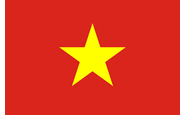Government/Policy

December 20, 2021
UPDATE: Commerce Nixes SDI Duty-Circumvention Case vs. Vietnamese Coated FR Steel
Written by Michael Cowden
The Commerce Department has declined to initiate a duty-circumvention case filed by Steel Dynamics Inc. (SDI) against Vietnamese coated flat-rolled steel made from Japanese substrate
The decision came on the heels of opposition from big foreign mills, major steel importers and exporters, as well as lobbying groups in Japan and Vietnam.
![]() “Commerce finds that SDI did not provide adequate basis for the initiation of a minor-circumvention inquiry,” the department said in a decision dated Friday, Dec. 17, and filed online on Monday, Dec. 20.
“Commerce finds that SDI did not provide adequate basis for the initiation of a minor-circumvention inquiry,” the department said in a decision dated Friday, Dec. 17, and filed online on Monday, Dec. 20.
And the department stressed that its decision was final: “Commerce will not consider any further information, comments or requests … from any interested party.”
Fort Wayne, Ind.-based SDI filed its petition in November, as SMU has previously reported.
The Case Against Initiating
The group lined up against that case – represented in some instances by white-shoe law firms – included traders Duferco, Macsteel International and JFE Shoji America as well as a subsidiary of Australian steelmaker BlueScope.
Also opposing the trade action were the Japan Iron and Steel Foundation (JISF) and the Vietnam Steel Association.
They said Commerce should refuse to initiate SDI’s duty circumvention case against Vietnamese coated product – think galvanized or Galvalume – that originated as Japanese coil because doing so would have been inconsistent with U.S. antidumping and countervailing laws. It also would have broken precedent set by previous anti-circumvention cases, the groups said.
The SDI case was also too broad. If it had succeeded, it would have resulted in existing U.S. duties on Japanese hot-rolled and cold-rolled coil being expanded to cover any products made from Japanese substrate anywhere in the world and not just in Vietnam. “If Japan-origin substrate were used to produce (coated) in Korea, then … (it) would nonetheless be considered HR or CR steel from Japan,” attorneys representing international mills and traders said.
Japanese hot-rolled and cold-rolled exports to the U.S. were hit with duties in 2016 following successful trade cases filed by domestic mills in 2015. But Japanese coated is not subject to those duties because it is a separate product.
That’s another reason behind the Commerce decision not to initiate the anti-circumvention case: it would effectively blur the line between hot-rolled, cold-rolled and coated.
The Commerce Department has in previous cases decided that hot-rolled and cold-rolled coil undergo a “substantial transformation” when they are coated (with a layer of zinc when it comes to galvanized product, for example), the JISF said. And accepting that coated steel is simply hot-rolled or cold-rolled that has seen “minor alteration” would have undercut long-standing product classification standards as well as other successful anti-circumvention cases against Vietnam.
Domestic mills, for example, won a circumvention case against coated product made in Vietnam from hot-rolled and cold-rolled substrate made in China. The difference: Chinese coated product was also subject to duties, whereas similar product from Japan is not, the group said.
The Vietnam Steel Association added that SDI’s petition violated the spirit of anticircumvention law established by Congress. Case in point: The Senate Finance Committee specified in 1987 that portable electronic typewriters from Japan were evading U.S. duties by adding a calculator or memory feature. That “minor alteration” did not change the fact that they were still portable typewriters.
The same cannot be said of coated product, which cannot be used interchangeably with hot-rolled or cold-rolled coil, the association said.
Market Impact and Reaction
The SDI case had potentially big implications because Vietnam is one of the largest suppliers of coated flat-rolled steel to the United States. The Southeast Asian nation shipped 321,857 metric tonnes (354,786 short tons) of hot-dipped galvanized, electrogalvanized and “other” metallic coated steel (a category that includes Galvalume) to the U.S. through the first 10 months of 2021, according to Commerce Department figures.
That made Vietnam the biggest source of such products behind only Canada and Mexico, whose supply chains are deeply interwoven with those in the U.S.
It was also notable in that it has generated such intense legal opposition from big companies like Duferco.
But while some sources said the case had the potential to alter the steel trade landscape, others said its legal foundations were not as solid as those behind previous successful circumvention cases targeting Vietnam and others.
Still other industry sources said the case might have accomplished its purpose even if SDI ultimately didn’t win. The retrospective nature of SDI’s petition meant that importers – be they trading companies, service centers or manufacturers – might have been uncertain as to whether material they might have ordered from Vietnam would or wouldn’t be subject to duties in the future.
And that uncertainty alone might have temporarily frozen the market, making companies more likely to steer orders to domestic mills or to foreign jurisdictions seen as less likely to be targeted by U.S. trade actions. In other words, if the goal was to kick up dust around whether it was safe to purchase coated steel from Vietnam, domestic mills might have at least bought some valuable time, they said.
By Michael Cowden, Michael@SteelMarketUpdate.com







